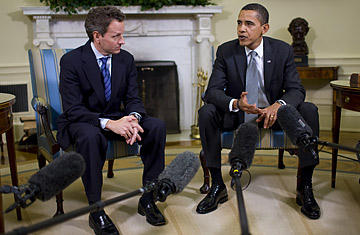
President Barack Obama meets with Treasury Secretary Timothy Geithner in the Oval Office
(2 of 4)
In fact, this crisis is an ideal opportunity for Obama to start keeping his campaign promises: providing tax relief and health security for ordinary Americans, restoring our economic competitiveness and reducing our dependence on environmentally disastrous fossil fuels that increase the power of our enemies. It's hard to imagine when he'll have a better opportunity. Nothing in the historical record suggests that when Congress has more time to deliberate — and more time to confer with the special-interest lobbyists and local-interest political advisers who dominate the decision-making of its members — it will enact fair tax policies, sustainable energy policies, wise infrastructure policies, responsible fiscal policies or any other policies tainted by long-term thinking or national-interest considerations. If Obama wants to push 21st-century change through Capitol Hill, he needs to use this emergency.
As I wrote last month, there are three questions we should ask about every provision in the package: Will it stimulate the economy quickly? Will it create long-term fiscal obligations? But also: Is it something we ought to do anyway? We need to zap the economy with a big jolt of federal dollars, and it's important that those dollars be spent in timely and temporary ways. But it's just as important that they're spent in ways that promote, and don't undermine, national priorities. Fast is good, but this downturn is likely to last awhile no matter what the feds do. So smart is better.
By these measures, some of the tax cuts in the current House and Senate plans are hard to defend. For example, both chambers included a tax credit for first-time home buyers, a classic hair-of-the-dog solution to a crisis with roots in an artificially inflated housing market; the credit wouldn't provide stimulus and it wouldn't point the country in a new direction. Similarly, as the nonpartisan Tax Policy Center pointed out, the Senate's $70 billion patch to the alternative minimum tax is "neither timely nor targeted" and "makes no sense as economic stimulus." And it's worth noting that the corporate tax cuts favored by the GOP critics who have screeched the loudest about the lack of stimulus in the stimulus happen to be lousy stimulus. But the biggest measure — a $145 billion payroll tax cut — is both good stimulus, because it targets low- and moderate-income earners who are more likely to spend it, and good policy, because it aims to start rebuilding the middle class and help ordinary families shafted by eight years of trickle-down tax policy.
